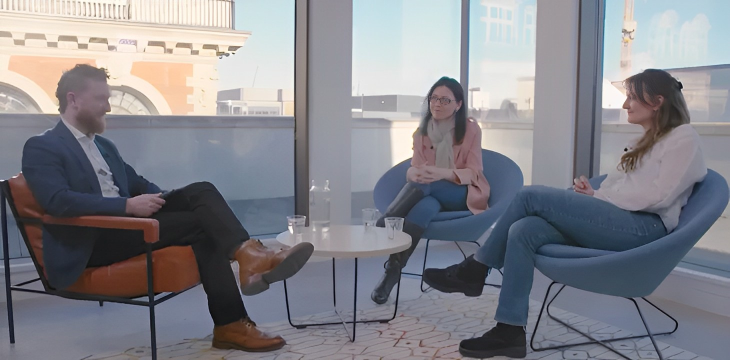|
Getting your Trinity Audio player ready...
|
What role can blockchain play in digital inclusivity and enhancing social welfare? That was the topic of a recent interview conducted by nChain Licensing Chief Science Officer Dr. Owen Vaughan. Joining him were former nChain research scientist and sustainability manager Dr. Chloe Tartan and Assistant Professor of Economics at Swansea University Dr. Annie Tubadji.
Blockchain-Based Distribution Model for Digital Inclusivity
Dr. Vaughan starts by explaining that this interview will explore blockchain’s role in improving social welfare and promoting digital inclusivity at the regional level.
Pivotal to this conversation is a paper written by Dr. Tartan titled The Blockchain-Based Distribution Model for Digital Inclusivity. It was published in REGION, an open-access journal by the European Regional Science Association (ERSA) and Vienna University of Economics and Business Administration (WU).
Dr. Tartan explains the key issues in the paper, noting that digital inclusion came into sharp focus during the pandemic when the push to remote work and online systems left many vulnerable people, particularly the elderly and those from disadvantaged socioeconomic backgrounds, behind.
Dr. Tartan asked how blockchain could help solve these issues. She was inspired by Bitcoin, pointing out that the network uses economic incentives to encourage competition and cooperation. Her paper tries to incentivize inclusion at the local level by running things like bingo nights to bring the elderly into the digital fold.
She explains that the aim would be to identify an at risk-group, mobilize groups already digitally included, and encourage/incentivize the latter to reach out and support the former. Data from these interactions would be gathered and stored on a public blockchain to help track the progress of the at-risk groups.
Dr. Tubadji explains that the REGION journal deals with helping local communities and governments to become as efficient as possible, taking problems that have been “boxed in” by cultural prejudice and trying to solve them. She explains that Tartan’s paper tackles digital inclusivity, which blockchain can help with while dramatically reducing the costs of running any such system.
Dr. Vaughan asks whether this validates blockchain as having a positive social impact. Dr. Tubadji answers that it’s the first step, but there’s an empirical process involved in proving this.
Delving deeper into how such a system would work, Dr. Tartan explains that the government would run it, and citizens’ data would be stored on a system controlled by them. The blockchain would be used to keep logs/audits of the data, such as detailing who accessed it, when, and any changes that were made. The blockchain would store fingerprints, changes, and inputs but not the data itself. She notes that it has not yet been demonstrated that blockchain technology can positively impact society, but she hopes her paper goes some way to changing this.
Can blockchain create accountability in an AI-powered world?
Dr. Vaughan then asks one more big-picture question—in a world increasingly powered by AI, which will make decisions regarding welfare and other aspects of our lives, can blockchain help shed light on those decisions, their fairness, and other aspects of the decision-making process?
Dr. Tartan answers that welfare is not new. There are many benefits to having automated systems deciding things, but it will lead to questions in some cases. Blockchain technology can definitely shed light on what decisions are being made and what they’re based on.
Dr. Tubadji says blockchain can show us what has been optimized for, by who, and more. She notes that existing AI systems like ChatGPT can be adamant even when they are wrong, and it will be essential to understand the basis of these systems’ decisions when we question them regarding fairness.
What’s next for both of the guests?
Dr. Tubadji says she wants to keep monitoring the evolution of human reception of these technologies. Right now, people like human work but trust artificial work more, and she finds the question of where all of this will lead, including its implications for discrimination and inequality, fascinating and exciting. She says we should think deeply instead of moving fast.
Dr. Tartan says she is on a mission to demonstrate the value of this technology and make it accessible to the general public. Blockchain technology has much to offer, and she wants to demonstrate its utility.
Watch: What is the State of the Bitcoin & Blockchain Space?

 02-20-2026
02-20-2026 




